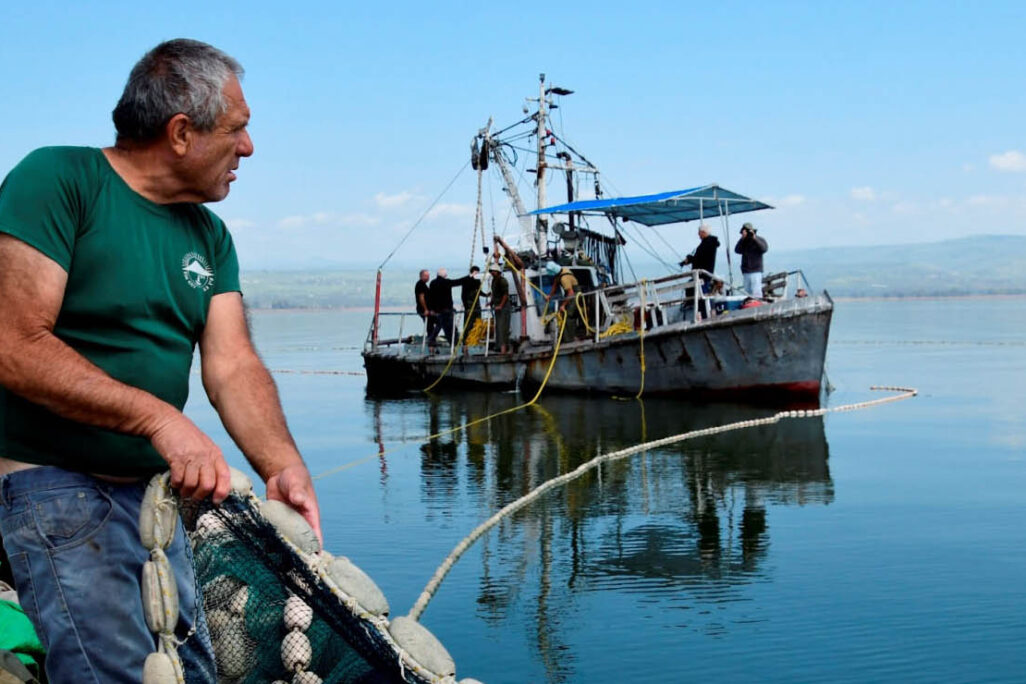
Over the last 41 years, fisherman Menachem Lev’s net has captured almost everything imaginable. His stories of fishing almost always feature words such as Zionism, pioneering and love of the land, but in recent years, privatization and the global import market have made an appearance. The industrial fish ponds’ competition and young Israelis’ desertion of manual labor have left him almost alone on the beautiful pier of Kibbutz Ein Gev.
During a day of fishing on the Kinneret, Lev tells Davar about his life and work. The conversation sails back and forth between the past and the future, but Lev refuses to be caught up with nostalgia or despair.
Fishing is a way of life
“Gil,” Lev’s fishing boat, is almost ready to leave its mooring in Ein Gev, a quiet kibbutz on the eastern shore of the Kinneret where Lev lives. At 8:30 AM, five young men from Lev’s fishing crew are already on board the 61-year-old iron boat, making final preparations. The Kinneret is usually high in summer; today, it is beautiful. An observer might mistake the expedition for a pleasure cruise, but a day of hard work is in store for everyone.
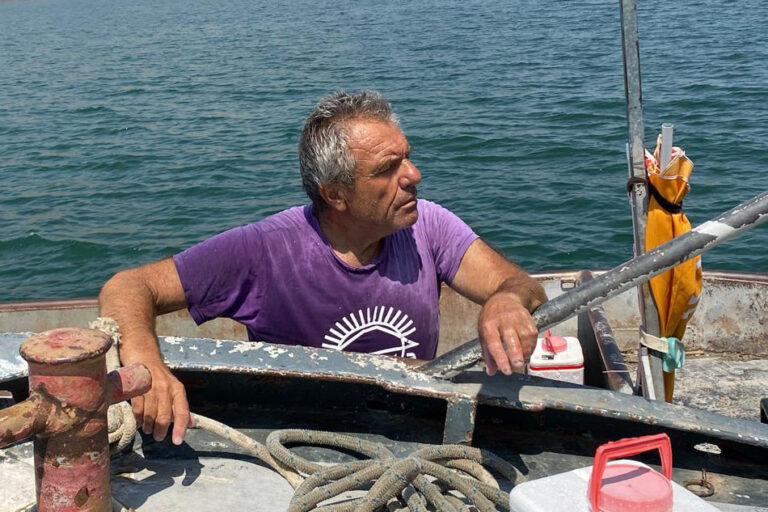
Captain Lev arrives at the wharf after a full morning of sending fish to the markets in refrigerated trucks, signing invoices and reporting his catch and sales to the Ministry of Health.
“Fishing is not a profession, it is a way of life,” he says. But this fisherman’s way of life is disputed today. Lev opens his own story with the history and importance of the fishing industry in the kibbutz.
“Fishing is the oldest industry in Ein Gev. [It’s] 84 years old, before the establishment of the state. Tiberias and Tzemach were still Arab areas then, and the Jewish settlements in the region were Rosh Pina and Moshava Kinneret. The goal was to obtain the necessary food from the sea,” he continues.
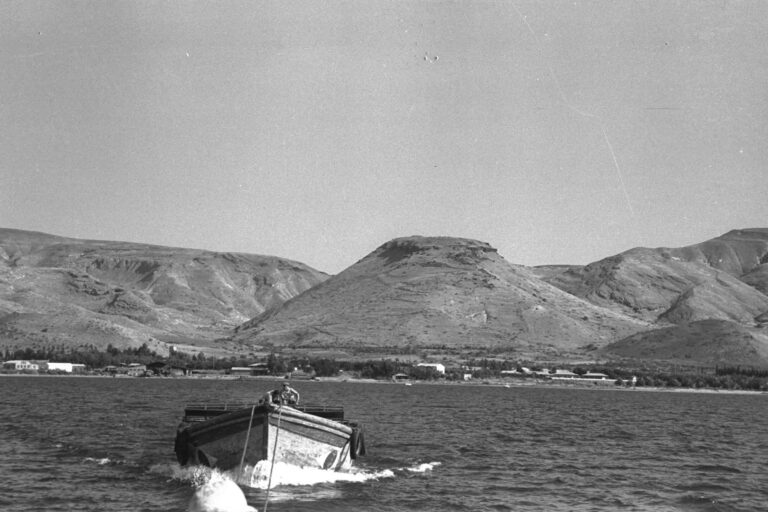
“Later, it was the fishing boats that prevented any debate about the Israeli presence on the eastern waterline until 1967. The boats guarded the Kinneret and the country. The fishermen were at the frontlines,” Lev explains.
“It’s similar to how the members of Ein Gev, and not the army, were the ones to take Susita [an archeological site about two kilometers east of the Kinneret, which was captured during the War of Independence by the Syrians, and occupied by a platoon of members of Kibbutz Ein Gev in July 1948].”
The Zionist spirit at sea
Lev deeply identifies with the ethos of the pioneer kibbutznik who fights with all their heart and soul. He is no less attached to the sea. Despite his age, he does his reserve duty in the Navy to this day.
“I’m connected to the sea, I’m a man of the sea,” he proclaims. He is also connected to history, explaining that his boat contains the only copy of a typewritten book from 1937, on the subject of the origins of fishing in the Kinneret and Lake Hula.
“[It’s] about the Hebrew, British, and Arab fishermen. There are fish prices here in pounds, correspondence between the kibbutzim and the Histadrut about backing up fishermen, and a national mission to understand how many fish there are in the Kinneret,” he says.
Lev grew up in Kiryat Haim, and was educated in a ken (local chapter) of the socialist Zionist youth movement HaNoar HaOved v’HaLomed (NOAL). He made the move to the kibbutz after the army.
He affectionately calls the old fishing boat “my wife,” and adds that “my wife at home is the mistress,” but is quick to emphasize that he is “married with great respect. My wife and I love each other and are good friends. We fall in love all over again all the time.”
The couple has four children, “who happened to be born without gills but are very attached to the sea,” Lev laughs.
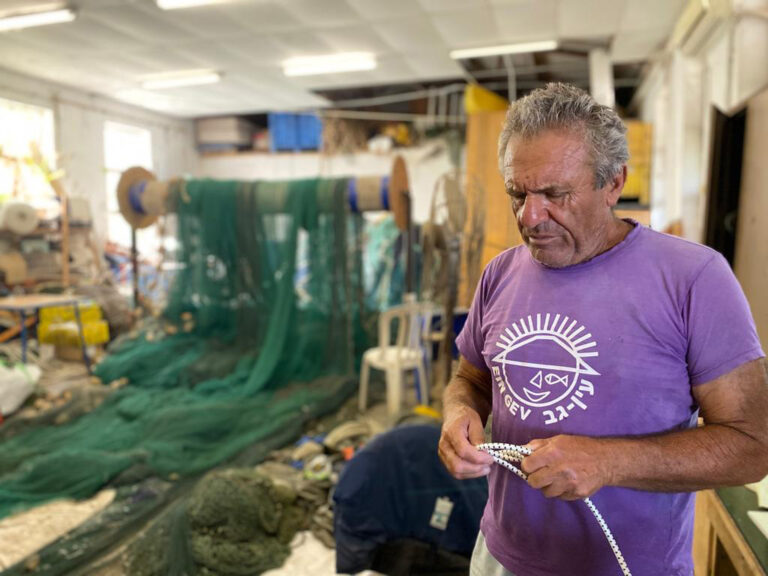
“I remain the last Ashkenazi fisherman in the Kinneret, and the last fisherman in the kibbutz movement. Not [artificial] fish ponds,” he emphasizes. “Real fishing.”
Ecological balance
Lev’s familiarity with the Kinneret is so deep that the best experts in Israel and around the world come to join him in his research and work.
“The Kinneret is an international natural phenomenon,” he explains. “It is the only lake in the world with fresh water below sea level. There is a micro-climatic phenomenon of a wind regimen that mixes the water and thus enriches it with oxygen at the top, preventing the Kinneret from becoming a marsh.
“In the Kinneret, there is no life below twenty meters because there is no oxygen. At a depth of 10 meters, the temperature is 10 degrees. In addition, the Kineret has a lot of algae but it has no smell. There is a unique ecological balance here.”
He treats the national landmark with great respect.
“The Kinneret is the water source of the country and therefore needs to be well maintained,” he says with undisguised admiration. “The Kinneret is very healthy. Everything is alive. There is a lot of water, you can see that the fish are healthy and big, you don't see [dead] floating fish, the water is clear and the atmosphere is good.”
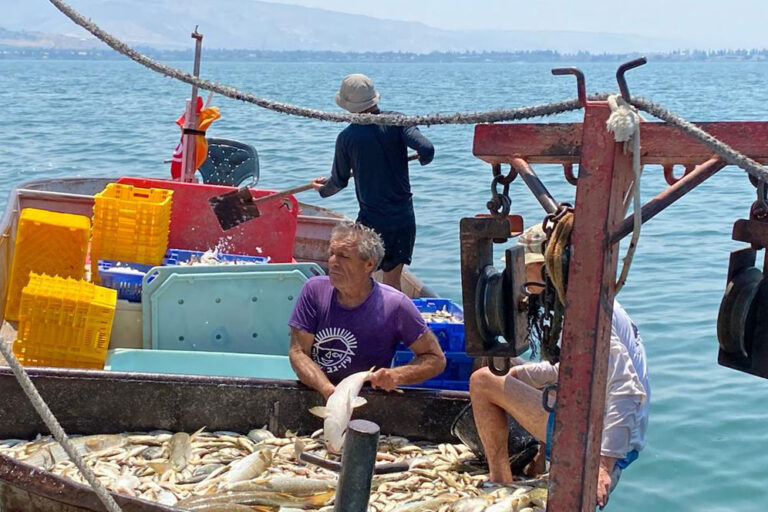
In his view, fishing is part of maintaining the ecological balance in the Kinneret and its surroundings.
“I love nature. I work with nature and I preserve nature,” he insists. “Everyone needs nature. Fish eat and we should eat fish. But do not do it for a hobby, not in ways that can [hurt] the Kinneret.
“We make sure that our practices are eco-friendly. No hormones, no antibiotics and no GMOs [genetically modified organisms]. We fish the most natural way there is, according to the law and in a measured way. The fact is that to date there are more fish than water in the Kinneret. Sometimes I catch 14 or 15 tons of fish a day.”
According to a senior fisheries official at the Ministry of Agriculture, the Kinneret suffers from a lack of fishing. The species “Kinneret tilapia,” which constitutes 80% of all fish in the lake, is fished only by Lev.
“The water and the fish belong to the locals”
According to him, this uniqueness of Kinneret fish also comes out in its taste: “people can’t believe how good it is,” Lev claims.
But the advantage of fishing ethically also has its challenges. Under natural conditions, fish grow much more slowly.
“A fish that needs to grow to 900 grams will reach it in an [artificial] pond in nine months. In the Kinneret, it will take five years. They don’t eat the sand and chicken droppings that pond-bred fish do.”
Lev’s fishing boat throws a net and then floats in a circle. The fish are caught as the net is pulled in, a method called “lap fishing.” Lev prefers this method to catching them in the gills with a hook.
When Lev has caught a sufficient quantity to meet the orders he has received, the rest of the fish are returned to the water. The fish caught by Lev and his crew are kept refrigerated on the boat, packed in the factory and sold the same day or the next day.
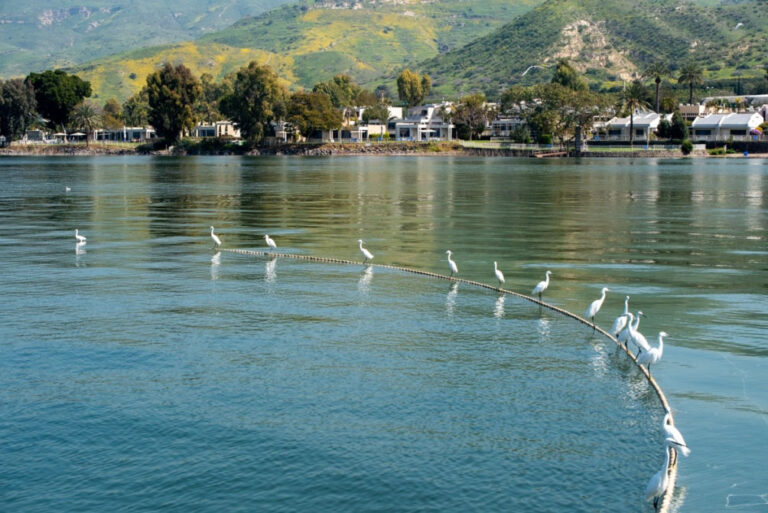
![Lap fishing. “People can't believe how good [the fish] taste.” (Photo: Yael Elnatan) Lap fishing. “People can't believe how good [the fish] taste.” (Photo: Yael Elnatan)](https://static.davar1.co.il/www/uploads/2021/08/050821_gev20-768x512.jpg)
“I volunteer to fish all over the world,” he says. “I was in Ethiopia for many years and I taught them to fish, I was in Uzbekistan and also in the Philippines. What I tried to do, unsuccessfully, was to create an understanding that the water and the fish belong to the locals. In all the Third World countries, they create a real slave market and take the fish away. I stopped going to work in these places because I received threats.”
The hunter
Lev’s methods may sound outdated, but he is not ashamed to use advanced technology. A sonar device has been installed on the old boat, which sends signals to the bottom and beeps according to what it picks up. According to the sound, Lev knows how to determine the type of fish below it and their quantity.
“I’m currently trying to make contact with the fish,” he says. “They want to live and I want to hunt them down and finish the order.”
From time to time, this sonar technology is also used for other purposes such as searching for missing persons who are suspected of drowning in the Kinneret.
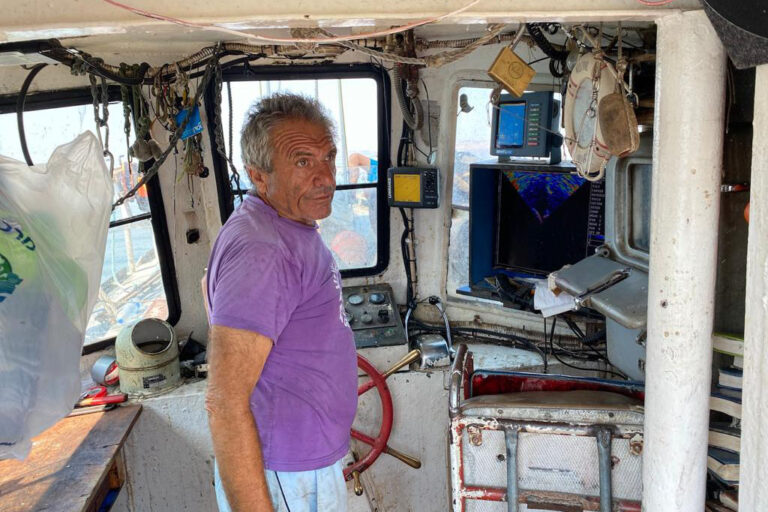
At a certain sound of the sonar, Lev stands. The cordial atmosphere transforms into one of action, and he shouts at the crew to drop the anchor. The net is thrown and the boat draws a circle of about 50 meters in diameter. “Sardines,” he declares. Thirty minutes later, the net closes at the bottom and is drawn back into the boat, with part remaining in the water. Using a rod, the fish are transferred to an adjacent boat, which includes a sorting area and ice boxes.
“At a glance, I know how many sardines I have here. That’s enough for my order today, 300 kilos,” he explains. “I’m releasing the rest.”
Without any sense of regret, he opens the bottom of the net that is left in the water, and the fish swim to freedom. “When I need them, I will catch them again,” he says.
Problems are part of the package
The boat goes on, the sonar beeps, and suddenly someone shouts “silence in the boat.” Again an anchor is dropped, a net released, and another success achieved – 140 kilo of mullet.
“When I throw a net, I don’t wait for anyone else,” Lev says. “That’s how I was taught. I’m a hunter and I have a target. I don’t throw a net and wait for fish to come.”
For the third time that day, curses fly on board. A malfunction in the equipment leaves the crew on the water for another two hours, with no further catches.
“There are damages and repairs all the time,” Lev says. “That’s part of it. Yesterday I stayed up until 11:00 PM sewing the net so that we could go out on time today.”
On a typical fishing day, the crew will cast a net about six times, until the entire order is met or until the wind from the west starts around 3:00 PM, forcing the boat to return to shore.
In the past, Lev would go fishing at night, since “there was a myth that there were more fish then.” But as the years went by and his family expanded, “my wife put a stop to it and I switched to fishing during the day. What did I find out? There are more fish in the day,” Lev recalls with satisfaction.
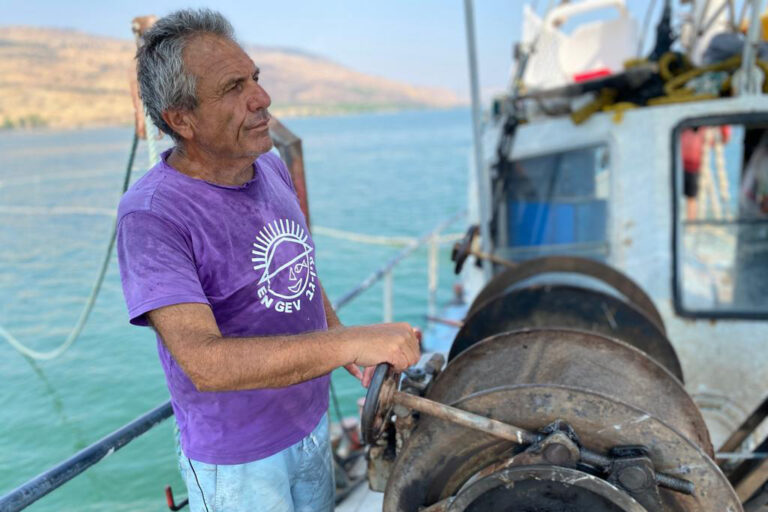
Fishing is an industry in Ein Gev, and as the central fisherman of the industry, Lev is also responsible for selling the fish.
“I catch between 300 and 400 tons of fish a year. Sellers who work with me do not ask me what I have – instead, I ask them what they want. I know in advance what I am selling to whom and what the price is. The variables are the condition of the boat and the net, and whether I catch at the right times.
“The ‘expensive’ market among the Jews in Tel Aviv ends on Wednesday,” Lev explains. “The Christian market is Wednesday-Thursday. I have a responsibility to keep prices stable in the market and not be dependent on slight market fluctuations.”
Privatization and determination
The fishing industry in Israel has faced challenges at home and abroad over the years. Lev says he has been struggling with the import market for the last 20 years.
“I would rather they compete with me in authentic fishing, and not in the fish ponds,” he says. “But today the lobby against me is over, they will struggle and I will stay, because I will survive.”
The state, he argues, is not helping.
“The Ministry of Agriculture has invested 75 million in fish cages in the Mediterranean, so that one storm will come [and destroy them,] and the state will compensate them. They did not invest a shekel in the Kinneret. If the fishing was profitable here, they would take the industry out of the kibbutz. The state doesn’t care at all, profit and government go together.”
According to him, his industry is currently just surviving. He can see the changes in his own enterprise, which shrank from two ships, twenty people and crews for day fishing, night fishing and unloading, to just one crew.
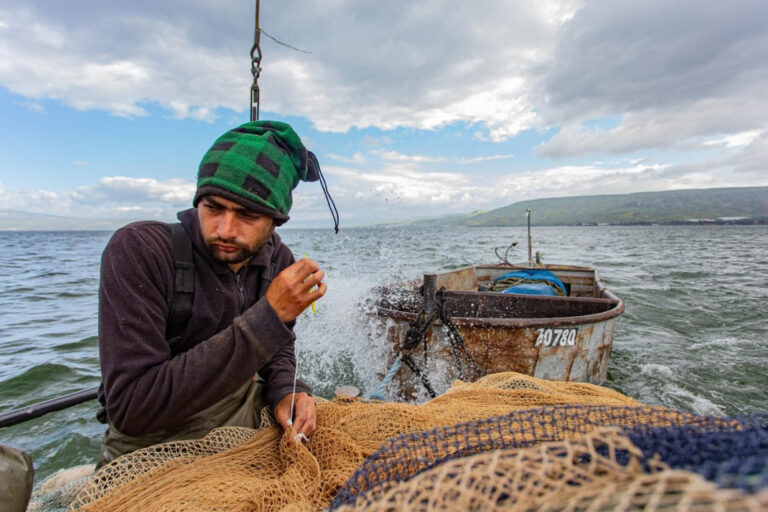
But it is not just the opening of markets to imports and fish cages that are threatening the industry. The changes the kibbutz itself has undergone have also had a great impact on its fishing industry. Specifically, the turn towards privatization.
“I am a prominent figure on the kibbutz,” Lev explains proudly. “The members of the kibbutz still see me as a leader. I am leading the first industry of Ein Gev.
“Once upon a time, money did not interest the kibbutz members. Today everyone is thinking toward the decisive day [when the kibbutz’ assets will be divided among the members]. I hope that that is the day that God will take me. I would like to be buried at sea with the ship – without me, it is worth nothing.”
“I am not motivated by money. Fishing is like a hobby for me,” he concludes.
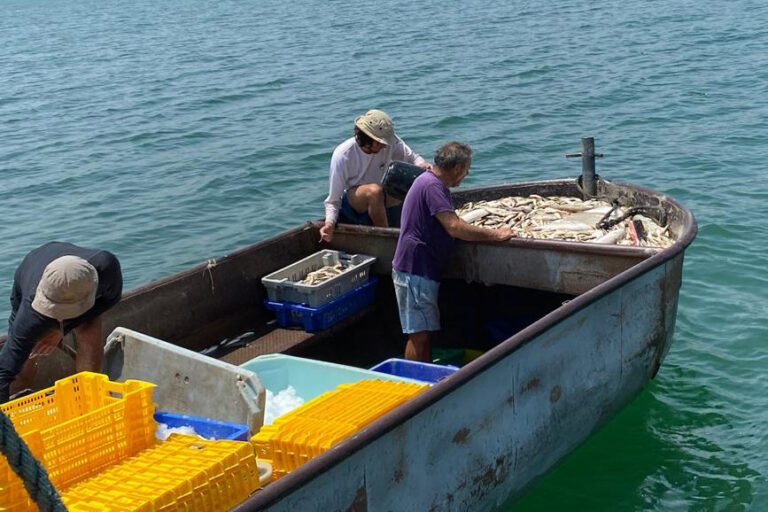
“The connection to the land is gone”
In accordance with the spirit of the times, Lev’s lack of interest in money was not passed on to the younger generation in the kibbutz.
“Once upon a time, children wanted to work in fishing, they would wait for their turn,” says Lev. “Since they’ve started working for money [for their personal accounts and not for the kibbutz economy], why would they work in a place with the smell of fish? They go work in the kibbutz resort or at restaurants.”
“To whom will I pass the legacy?” he asks angrily. “I taught a lot of people the job but everyone who knew how to work doesn’t stay in the kibbutz. The connection to the land is gone.Those who lack the core values of the original kibbutzim, a connection to the land and the past, will end up having nothing in the present.”
Lev believes in Israeli work as a way of life. As a second-generation Holocaust survivor, he refuses to keep German-made equipment on his boat, other than a 1942 seismographic instrument.
“All the repairs on the boat are done by me, I have many patents in my name in fishing, I invented things and they’re unique,” he says.
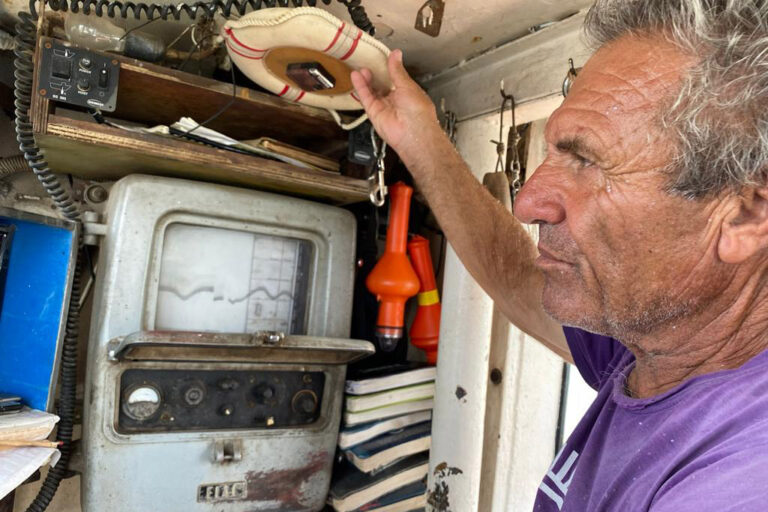
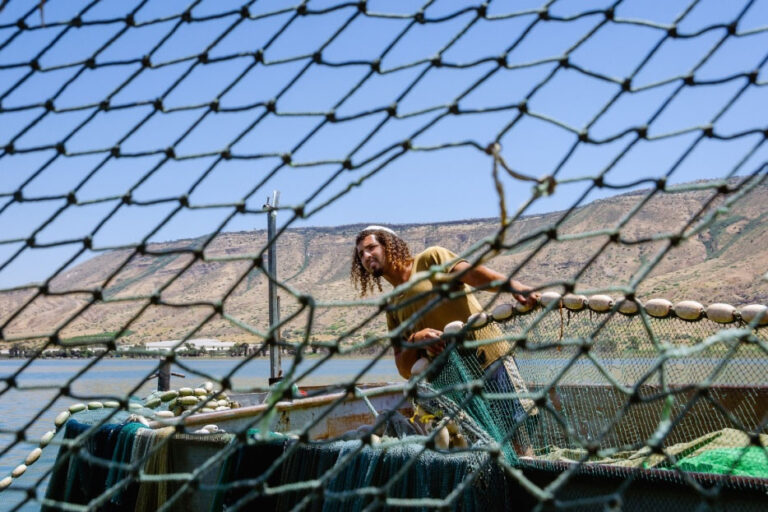
Lev’s fishing crew includes a kibbutz member, two young people from yishuv Shoresh who are there to work “until we get a better offer,” a student from Nepal who graduates this month and Gilad Ben Hamo (23), originally from the yishuv of Othniel in southern Hebron.
“Only Gilad understands fishing, lives fishing. He is a hunter,” says Lev. “He understands meaning, understands that there are no hours in fishing. He knows when we go out, but not where we will be and how we will get back.”
Last account
The fishing bar on the pier in Ein Gev was established by Lev in 2015 to provide “a place for fishermen to be, to have a place to sit.”
With his own hands, he built a place that looked like a luxury restaurant. “I brought Greece here. A tavern. That’s what I wanted,” says Lev.
When he enters the beautiful space barefoot, after a day on the water, it is unclear whether the young waitresses recognize him and know his work.
“It does not interest me at all,” he says. “I don’t even sell them fish, either they sell everything natural from the Kinneret or not at all.”
***
An exhibition is currently on display at Ein Gev in which 60 photographs, taken by 18 photographers, document Ein Gev’s fishing expeditions. The exhibition is open Mondays and Wednesdays from 5 PM to 7 PM, and will run until the end of October. Some of the photographs in the exhibition appear in this article.






